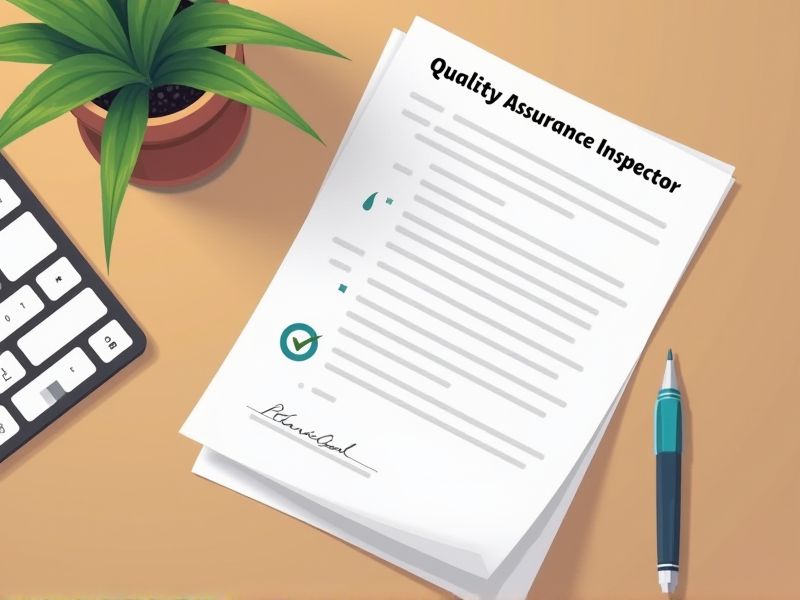
Quality Assurance Inspectors ensure that products meet specific standards and regulations, directly impacting consumer safety and production efficiency. Certifications provide validation of an inspector's skills, reinforcing their expertise in identifying and addressing manufacturing defects. Industry-specific certifications demonstrate a comprehensive understanding of relevant standards, which is crucial for maintaining compliance and fostering trust with clients and stakeholders. Key certifications for a Quality Assurance Inspector include options that align with industry requirements and professional growth.
ASQ Certified Quality Inspector (CQI)
The ASQ Certified Quality Inspector (CQI) credential is essential because it signifies a recognized standard of knowledge and skills in quality inspection processes. This certification ensures inspectors are proficient in using measurement tools and techniques crucial for precise quality assurance. The CQI certification requires a comprehensive understanding of quality principles, reducing the likelihood of defects and improving product reliability. Employers often prefer CQI-certified inspectors, as it can lead to enhanced productivity and a reduction in costly errors.
ASQ Certified Quality Technician (CQT)
Possessing an ASQ Certified Quality Technician (CQT) credential often leads to improved competence in quality control processes, as it provides in-depth knowledge on modern quality assurance techniques. This certification enhances a Quality Assurance Inspector's ability to identify defects and ensure consistent product standards, which is critical for maintaining company reputation and customer satisfaction. Moreover, holding a CQT certification usually indicates a higher level of expertise, which can result in increased job opportunities and career advancement. Additionally, the focus on accurate data analysis and problem-solving methods in the CQT curriculum equips inspectors with tools to effectively address quality-related issues, reducing waste and operational costs.
ASQ Certified Quality Auditor (CQA)
The ASQ Certified Quality Auditor (CQA) certification equips Quality Assurance Inspectors with the essential skills to assess and improve audit processes effectively. Quality auditors with CQA knowledge can systematically identify irregularities and facilitate compliance with industry standards. Possessing CQA certification often leads to enhanced credibility and trust within organizations, supporting a quality-first culture. The structured understanding from CQA helps in reducing errors, which in turn ensures product reliability and customer satisfaction.
Certified Quality Improvement Associate (CQIA)
Certified Quality Improvement Associates (CQIA) are essential for Quality Assurance Inspectors because they bring a structured problem-solving approach, enhancing overall product quality. Their expertise in quality tools and techniques enables the identification of process inefficiencies, leading to more efficient production outcomes. CQIA certification equips inspectors with a keen understanding of statistical methods, crucial for analyzing data accurately and making informed decisions. By integrating continuous improvement methodologies, CQIA-certified inspectors play a vital role in fostering a culture of quality within the organization, influencing long-term operational success.
ISO 9001 Lead Auditor Certification
ISO 9001 Lead Auditor Certification equips a Quality Assurance Inspector with a comprehensive understanding of standardized quality management principles. This certification enables the inspector to effectively assess and improve organizational processes, leading to enhanced product quality and customer satisfaction. The rigorous training involved helps in identifying non-conformities and implementing corrective actions, thereby reducing defects and improving efficiency. Having this certification also boosts the inspector's credibility and career prospects as they can assure stakeholders of consistent compliance with international standards.
Six Sigma Green Belt Certification
Obtaining a Six Sigma Green Belt Certification equips a Quality Assurance Inspector with tools and techniques essential for process improvement and defect reduction. This certification enhances problem-solving abilities, allowing inspectors to identify inefficiencies and propose effective solutions. Improved process efficiency directly correlates with increased product quality and customer satisfaction levels. Possessing this certification often increases job marketability and career advancement opportunities within quality management sectors.
Lean Six Sigma Certification
Lean Six Sigma Certification equips a Quality Assurance Inspector with tools to identify and eliminate inefficiencies in processes, which leads to higher quality outputs. It enables inspectors to apply data-driven methodologies, enhancing problem-solving skills crucial for maintaining product standards. With certification, inspectors are often more adept at reducing variation in manufacturing or service environments, ensuring consistency. Companies benefit as certified inspectors can contribute to cost savings and improved customer satisfaction, driving competitive advantage.
Total Quality Management (TQM) Certification
A Total Quality Management (TQM) Certification equips Quality Assurance Inspectors with a comprehensive understanding of quality control principles, improving efficiency in identifying and solving issues. By embedding methodologies like continuous improvement and lean management into their skill set, inspectors drive higher product quality and customer satisfaction. This certification reinforces the inspector's ability to implement standardized processes that reduce defects and operational costs. Organizations often prefer certified inspectors, as TQM principles align with global quality standards, enhancing competitiveness.
OSHA 30-Hour General Industry Certification
Obtaining the OSHA 30-Hour General Industry Certification equips a Quality Assurance Inspector with the essential knowledge of workplace safety standards, which directly reduces the risk of accidents and injuries during inspections. The certification ensures that inspectors are well-versed in identifying potential hazards, enabling more effective implementation of safety measures in industrial settings. With the training provided, inspectors can effectively advocate for safer work environments, fostering compliance with federal regulations. This certification also boosts credibility with employers and clients, linking enhanced vigilance in safety oversight to assurance of product and process quality.
Certified Manager of Quality/Organizational Excellence (CMQ/OE)
The Certified Manager of Quality/Organizational Excellence (CMQ/OE) credential elevates a Quality Assurance Inspector's skill set in leading quality improvement initiatives, directly impacting product reliability and customer satisfaction. The certification provides advanced knowledge in strategic planning and process analysis, critical for identifying inefficiencies and implementing corrective measures within production processes. Data indicates that organizations with CMQ/OE certified professionals often experience reduced defect rates due to enhanced quality control measures. Holding the CMQ/OE also signals to employers a commitment to professional development, often correlating with increased career advancement opportunities.
Summary
When you, as a Quality Assurance Inspector, obtain certifications, your expertise and credibility significantly increase. Consequently, your ability to identify and address potential issues improves, leading to higher product standards. Certified inspectors often experience enhanced career opportunities and increased job security within the industry. These certifications can also elevate the trust and satisfaction levels among clients and stakeholders.
